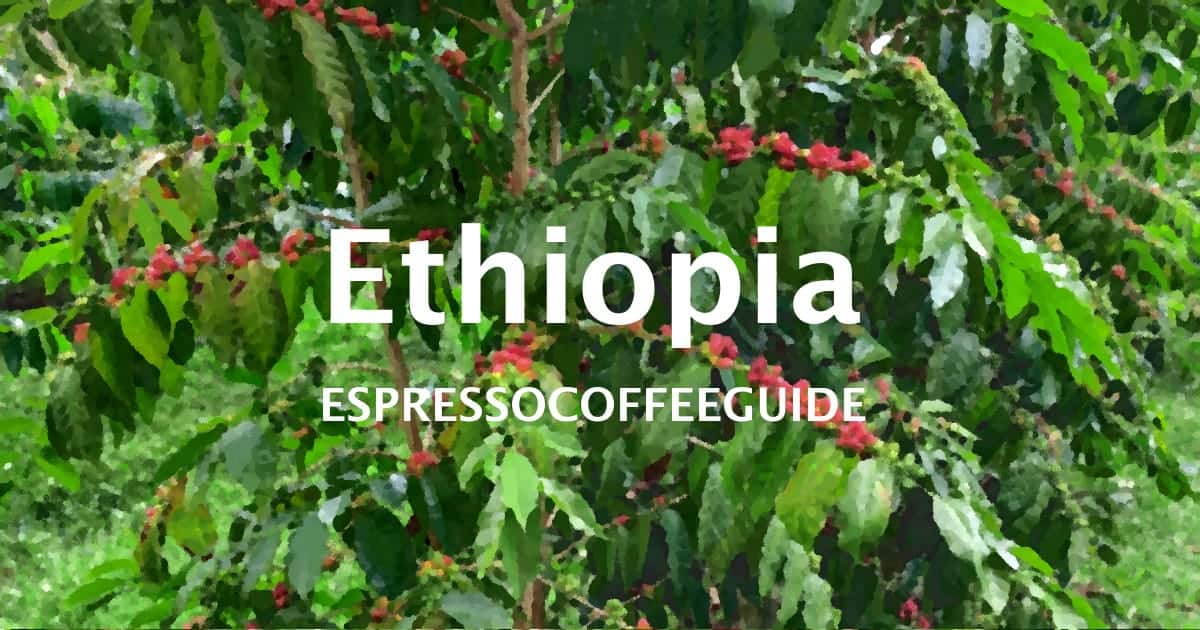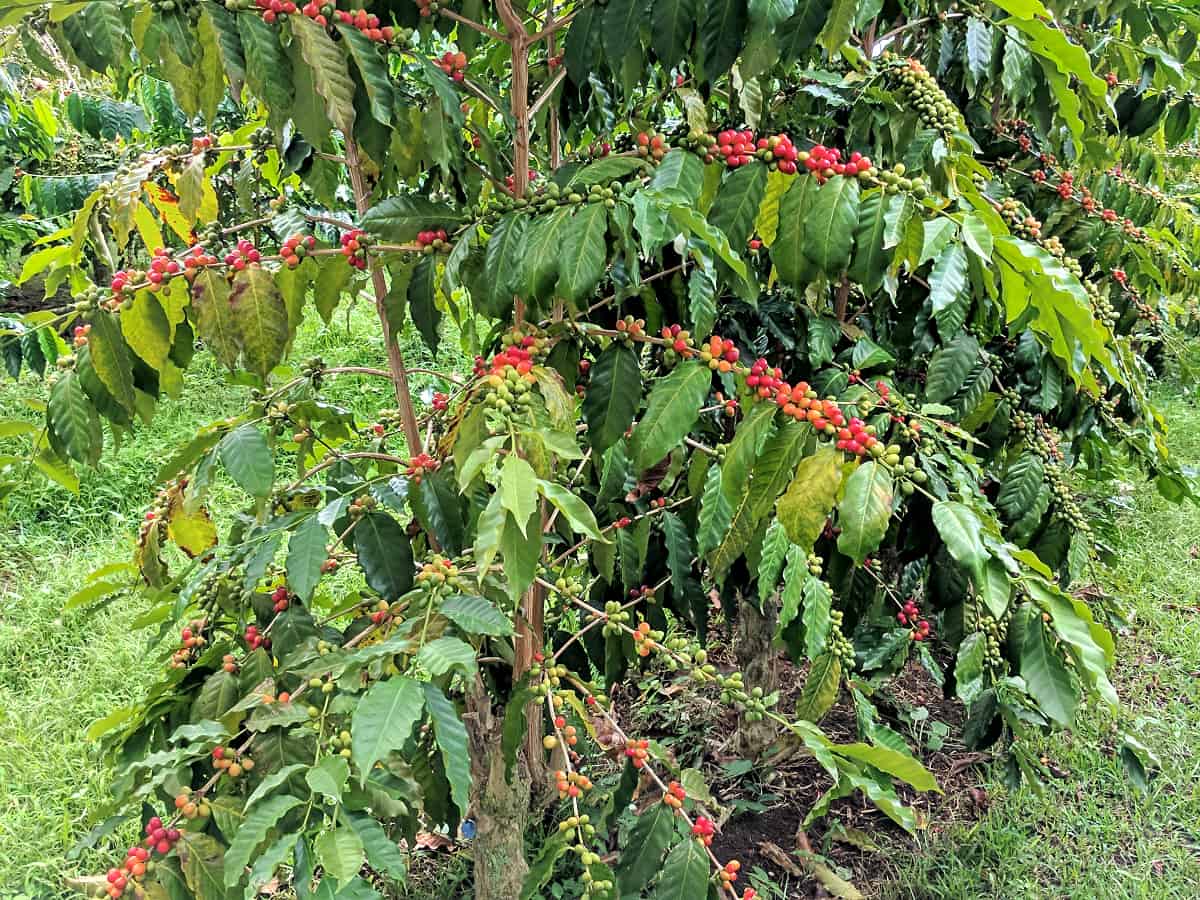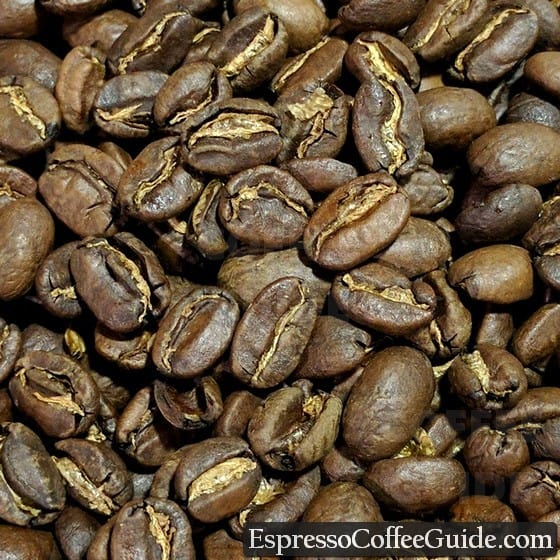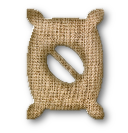Known for its sweet flavor and aroma with a light to medium body. Ethiopian Yirgacheffes are spicy and fragrant, and are frequently reviewed and rated as some of the highest quality Arabica coffees in the world. Their premium reputation also often means they carry a premium price, but even so, they offer better value for your money than other comparables (such as Hawaiian Kona and Jamaican Blue Mountain).

- Growing Altitude: 1,700 - 2,200 meters above sea level
- Arabica Variety: Heirloom Varietals
- Harvest Period: October - December
- Milling Process: Washed, Sun-dried
- Aroma: Floral, Sweet
- Flavor: Complex, Fruity, Tea, Floral, Lemon
Yirgacheffe coffees are available as both regular and Fair Trade Organic certified.
Jump to:
Review
Yirgacheffe coffee is a wet processed coffee grown at elevations from 1,700 to 2,200 meters above sea level, and is the considered the best high grown coffee in southern Ethiopia, an exotic coffee region known for fine coffees. These elevations qualify Yirgacheffes as Strictly High Grown (SHG) / Strictly Hard Bean (SHB) coffees, where coffees grow slowly due to the altitude, allowing additional time for the tree to deliver nutrients to the coffee and develop the best flavors.
A fine Ethiopian Yirgacheffe coffee displays a bright acidity along with intense, clean tastes and a complexity of floral notes in the aroma, sometimes with a hint of toasted coconut. Cupping notes frequently mention the aftertaste being vibrant, and the coffee may exhibit undertones of berry or wine.
Some premium Yirgacheffes tasting notes indicate it can have a slightly nutty or chocolaty. quality. Others display subtle tones of tangerine and citrus. These qualities make it a preferred varietal for a refreshing iced coffee.
Yirgacheffe coffee is generally milder than Ghimbi coffee and also more aromatic and fruity, sometimes exhibiting a lemony tart twist. In contrast to the jammy and wild Ethiopian Harrars, the Yirgacheffes are high-toned, floral and citrusy.
Green Coffee

The town of Yirgacheffe (Irgachefe) is in Ethiopia's Sidama (or "Sidamo") area at an elevation of about 1,900 meters above sea level and is the administrative center of the coffees-growing district. Yirgacheffe coffee farmers are often members of the Yirgacheffe Coffee Farmers Cooperative Union (YCFCU), which comprises 23 different member cooperatives, which consists of over 40,000 farmers. Members of the YCFCU are exempt from the Ethiopian Coffee Exchange (ECX), which allows them to receive a premium for their premium coffees, including Fair Trade and Organic certifications.
Some Yirgacheffe farmers may also be members of the Oromia Coffee Farmers Cooperative Union (OCFCU), which more generally comprises small farmers from the Oromia region of Ethiopia. Consolidation of the processing, sorting and sales functions allows for greater market efficiencies and more control over the reputation of Ethiopian coffees. It allows for more stability for the farmers by spreading out payments throughout the year, which is largely beneficial to farmers who have yearly growing and harvesting seasons.
These cooperatives ultimately provide the contact-point for exporters who sell the best unroasted green coffee beans to distributors and wholesalers in bulk, and ultimately, the roaster.
Some say that the Yirgacheffe area is the site of coffee's origins, though there is some debate over this issue. See World's Best History of Coffee.
Roasting
A Medium Roast is best used for unroasted Yirgacheffe green coffee beans to allow its delicate qualities to shine and enhance the coffee's bright acidity.
A Medium-Dark Roast or Dark Roast may be used for those who prefer their coffee a bit more heavy and sweet, but roasting dark tends to lose some of the finer qualities of a Yirgacheffe, for which you're usually paying a bit of a premium, lessening the value of that premium.

The key to a great roast is always starting with a good unroasted green coffee from a reputable wholesaler. Green coffee importers typically have a range of Yirgacheffes on hand and can offer samples for new and experienced roasters alike to try.
Among all of the planet's finest specialty arabica coffees Yirgacheffe consistently rates among the best tasting. Also see Ethiopian Coffee.
Espresso
These coffees do surprisingly well into an espresso roast, with the fruity flavors tending to remain prominent.
We would err on the lighter side of an espresso roast, or simply a dark roast in an espresso machine.
Brewing
With great care taken through the growing, harvesting, processing, sorting, distribution, roasting and final delivery stages, how much you enjoy the final product will depend on your brewing method and preferences.
Premium, high quality coffees like the Yirgacheffe should be enjoyed to the fullest - ground properly, and brewed slowly using a french press or pour over (eg. Chemex) without a paper filter so that the full spectrum of flavour can be experienced.
Paper filters will strain out all of the coffee grounds leaving nothing at the bottom of your keep, which is typically seen as a positive, but it also removes most coffee oils, which contain much of the flavours.
Personal tastes vary however, and you should brew your coffee how you enjoy it.
A number of brands sell Ethiopian Yirgacheffes on Amazon, but special care must be taken to choose companies that ship from their own locations. Yirgacheffe is a highly rated coffee and should always be fresh roasted - if a company stocks roasted coffee on shelves, chances are it was roasted weeks or months prior and had to travel through distribution and get stocked before becoming available to purchase.
This long waiting time results in a flat, flavorless coffee relative to what's possible from a company that roasts fresh to order. Starbucks also frequently features the Yirgacheffe as a single origin - not a blend - through their Starbucks reserve program.
As always, we recommend buying whole bean to preserve freshness and grinding just before brewing.
Buy Yirgacheffe Coffee Beans
- ✔️ Fresh roasted to order
- ✔️ 100% high qualtiy Arabica coffee
- ✔️ Custom grind (or whole bean)
- ✔️ 1-way valve, laminate bag (for freshness)
- ✔️ Bulk discounts
Green Coffee Production
| Year | 60kg bags | Coffee grown |
| 2016 | 6,600,000 bags | 871,200,000 pounds |
| 2015 | 6,713,975 bags | 886,244,753 pounds |
| 2014 | 6,625,262 bags | 874,534,558 pounds |
| 2013 | 6,527,444 bags | 861,622,595 pounds |
| 2012 | 6,233,007 bags | 822,756,871 pounds |
Green Coffee Exports
| Year | 60kg bags | Coffee exported |
| 2016 | 0 | 0 pounds |
| 2015 | 3,091,980 | 408,141,360 pounds |
| 2014 | 2,872,260 | 379,138,320 pounds |
| 2013 | 3,044,440 | 401,866,080 pounds |
| 2012 | 3,166,010 | 417,913,320 pounds |
Data may not be available for the most recent year.
Source: ICO
Facts

























produced 886,244,753 lbs
exported 408,141,360 lbs
That's only 46% exported!
Sounds like a lot? It's actually 4.4% of the coffee grown worldwide.

(that's 4,922 to 7,218 ft)
Source: ICO


Saad
Team,
Can you deliver Unroasted green coffee beans to UAE ?
Ahmed mohammed
We can send you a sample of Yirgachefee green coffe coffee bean , would you like to taste ?
Barry Hayden
I'd like some advice on dose size and grind - any comments?
Tshibase
The best coffee i have ever had trust me have it as a pour over I'm a barista at Jarryds espresso bar and eatery sea point Capetown.
Purwo susanto
I like The Ethiopian Yirgacheffe very much .
The other competetive to this is The Jamaica Blue Mountain!
WE have to Be carefull to buy The Blue Mountain from Jamaica not mixed with other Beans from other country,
This make The Blue Mountain cheapef!